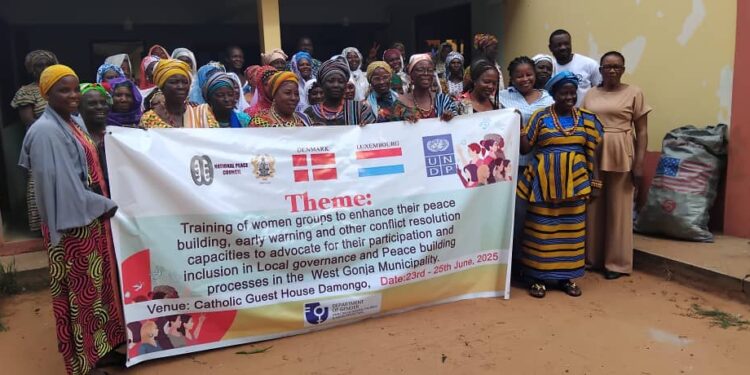By; Edwin Gogu
A three-day capacity building workshop aimed at empowering women in peacebuilding, conflict resolution, and local governance in the West Gonja Municipality has ended today, 25th June, 2025 with calls for continued investment in women’s leadership at the grassroot level. The training, organized by the Savannah Regional Peace Council with support from the United Nations Development Programme (UNDP), brought together 50 women from various communities and organizations across the municipality.
The event was held under the theme: “Training of Women Groups to Enhance Their Peace Building, Early Warning and Other Conflict Resolution Capacities to Advocate for Their Participation and Inclusion in Local Governance and Peace Building Processes in the West Gonja Municipality.”

Representing the UNDP, Melody Azinim, Peace and Governance Analyst, emphasized the significance of the project titled “Boosting Women’s Economic Resilience and Inclusion in Decision Making and Peace Building in Ghana,” which is being supported by the governments of Denmark and Luxembourg.
“Women and children are often the most affected during conflicts, yet they are hardly included in peacebuilding processes,” she noted. “This project seeks to change that by equipping women with the knowledge, mentorship, and tools to participate confidently in decision-making and peace processes, especially at the grassroot level, where real transformation begins.”
She highlighted that apart from peacebuilding training, the broader project also supports women’s livelihoods through agro-processing initiatives and dry-season farming, including the provision of a mechanized borehole system for the Yipala community. According to Azinim, access to water was found to be a key barrier to women’s participation in leadership and decision-making, as domestic duties often limited their involvement in community activities.

Queen Mother and Peace Council member Mbitiwurche Alijata Haruna expressed satisfaction with the outcome of the workshop and described the participants’ engagement as highly encouraging.
“Our objectives have been achieved. The women actively participated and showed that they are ready to take the knowledge back to their communities,” she said. “Women are natural peacebuilders. They listen, mediate, and nurture. These are exactly the traits needed to maintain harmony in our communities.”
She also called for an extension of such trainings in the future, recommending a week-long program to deepen impact and reach more women across the district.
One of the participants, Bombo Wuriche Memunatu Gaddo, a queen mother and peace advocate, described the training as enlightening. She shared how she had already applied her learnings during a group activity where she mediated a mock family dispute, highlighting how the workshop had enhanced her confidence and practical skills.
“As queen mothers, we are expected to give counsel, and this training has given me insight on how to intervene constructively in community and palace matters,” she said. “Peace is something we must preach and practice every day not only when conflict arises.”
Addisah Bukari, the Savannah Regional Gender Desk Officer and an implementing partner, echoed this sentiment, stressing that women, given the right tools, can play even greater roles than they currently do in promoting peace.
“We have been equipped with mediation techniques and strategies to handle inter-ethnic conflicts, domestic disputes, and social misunderstandings,” she said. “Women build homes, and by extension, societies. With continued support, we can contribute significantly to national peacebuilding.”
While participants praised the depth and quality of the training, many called for longer and recurring workshops to reinforce lessons and reach more women.
The Peace Council affirmed its commitment to supporting women-led peace initiatives and encouraged participants to serve as ambassadors of peace in their respective communities, cascading the knowledge gained to foster unity, stability, and inclusive development across West Gonja.



















